There are many ways to support school growth, but having the best talent is key.
Admissions advisors are first point of contact with the students and help establish early student success and prevent student dropout. In this thought leadership session hear industry leaders share first-hand examples of how they built a highly effective and motivated team.
Watch the recording here:
Speakers:
- Carla Jones, MBA – Business Development Consultant & Digital Marketing Director at SSG Business Solutions
- Matt Lamb – Director of Remote New Hire Ramp Program at Ultimate Medical Academy
- Anthony Romo MHRM, MBTI, TCF – Vice President of Enrollment & Graduate Services at San Joaquin Valley College
- Violeta Tamayo – Senior Account Executive at LeadSquared
Key Takeaways:
- Dedication, integrity, and fearlessness are excellent qualities that make an admission advisor.
- Pivoting, changing, and growing with the times in admissions isn’t the same as before. The prospective student has also changed.
- Regarding retention, newer employees might need more practice and enhancement training in some areas, as opposed to those who have been with a school for over a year.
- An open door where employees could come back and have genuine feedback/conversation is another great way to retain them.
- Objective clarity, which comes with the correct data, is critical to be successful.
“Education is the only business still debating the usefulness of technology” – Rod Paige.
Technology has touched almost every aspect of innovation and development in this day and age.
The theme of this webinar is how the same developmental factors can be used to grow your school and thrive in this competitive business.
Violeta Tamayo, Senior Account Executive at LeadSquared, starts the webinar with a brief introduction of herself.
She invites Carla, an MBA 27-year operations and higher education executive who provides consulting services to the health and beauty industry, to set the tone of the discussion.
The session begins with a high-spirited self-introduction from Carla and her fellow webinar panelists.
Three primary agendas are set for the discussion
- Who is the ideal admission advisor?
- How to make and retain the right hire?
- Top onboarding and training tactics
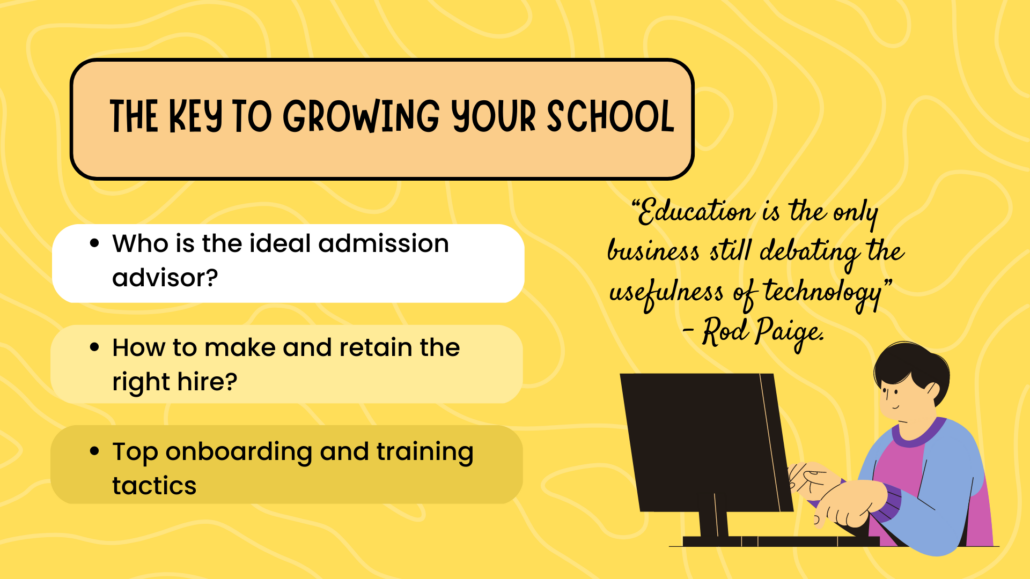
The first topic on the list of agendas is “What traits and characteristics do you look for when seeking admissions advisor applicants.”
Matt Lamb, Director of the Remote New Hire Ramp Program at Ultimate Medical Academy, was the first to share their take on this.
He says, “When seeking applicants, a little background really quick 30 seconds will be helpful.”
Within the past year, his team has taken on the responsibility of centralized interviewing for all admissions.
The biggest positive of this is that the trainers that work with them when they start the job are the trainers that interviewed and hired them. They learn from their successes or opportunities interviewing and know who will be coming into the role and why.
The recruiters know what they liked about someone in the interview and can reinforce some of those characteristics.
Another thing Matt especially looks for when hiring is a responsible, hardworking person who takes pride in their work.
“If they show up every day, work hard and care about doing a good job, and are passionate about caring about the students too,”— that’s a big yes from Matt.
The last quality that must check in a candidate to be on Matt’s hiring list is being passionate about what they are helping students do.
Next up, Antony Romo, Vice President of Enrollment & Graduate Services at San Joaquin Valley College, shares his lookout on the topic.
“For me, number one is integrity.”
According to him, integrity is something that goes beyond admissions. There should be integrity in just having the opportunity to be in student services.
The second quality that works for him is belief.
“They have to believe and show interest in what we do. You can’t hire somebody just because they have sales experience,” Antony explains.
The third quality that’s also very important to him is someone who’s intrigued by people. He explains, “Over 50% of what we do in admissions is listening.”
Further explaining his point, he says, “If we do listen the right way, we’re invested in people. We shouldn’t be invested in the win and getting the enrollment and just bringing somebody on just because this is not a game, and it’s not a point system.”
The last factor that completes his list is fearlessness
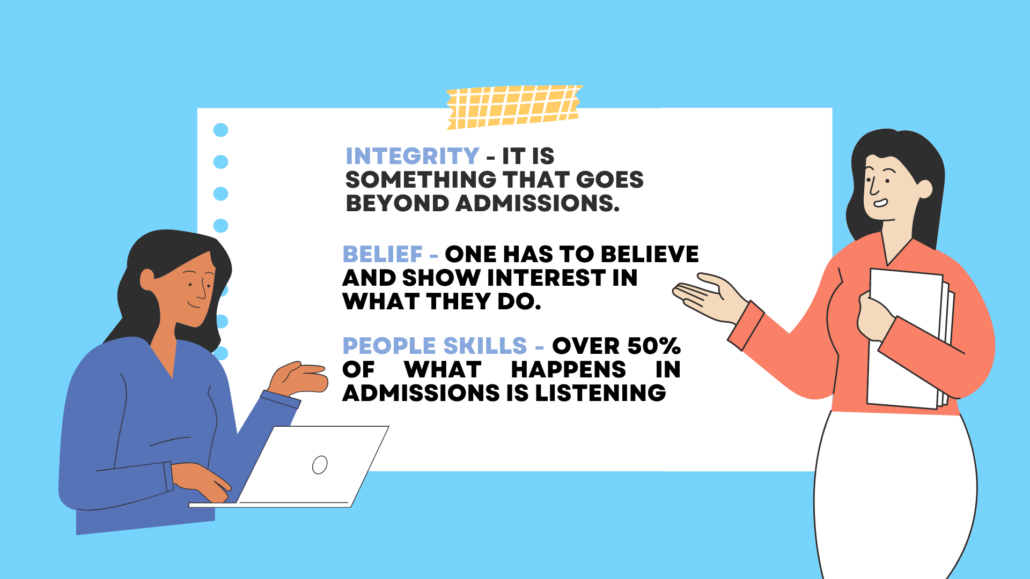
“You can’t train somebody to be fearless, and so that is absolutely important,” Antony concludes.
At this point, Violeta pointed out how both Matt and Anthony had mentioned that pivoting, changing, and growing with the times in admissions aren’t the same as before. It goes to show how the panelists were aware that times had changed concerning admissions.
Carla adds her perspective to this and states how the prospective student has also changed.
Along the lines of this discussion, Carla asks her fellow panelists to share their views on “How much weight must be put on personal skill sets versus those hard skill sets like listening.”
For Anthony, the answer to this is balance.
“So, for me, it’s still 50-50,” he says.
While the technology and training can be provided to someone who’s coming on board, everything else is up to them to bring to the table. This calls for a delicate balance between the skills they’re looking for.
However, for Matt, it’s not 50-50.
“I’d say I’m more on the personal traits end of the spectrum than the hard skills. However, it’s not that far off. It’s 60-40 or 70-30,” is his take on this.
He further explains how if a person believes in what they’re doing and/or their passion, that’s what’s more important. They must want to do a good job for the right reasons, which, in terms of admission, will be good for the school, students, and everybody else.
At the end of this discussion, Carla puts forth the first poll of the session for the audience.
Poll – “Do you have a retention strategy in place?”
Yes – 54%
No – 46%
Talking about the second agenda on the list — retention, Anthony shares how he feels that newer employees might need more practice and enhancement training in some areas, as opposed to the ones that have been with them for over a year.
He also says that fostering an environment of continuous feedback is very important, as it could be very easy in a performance-driven department to be extra critical of an employee.
What employers take for granted is how often they can positively affirm their employees on the things they are doing.
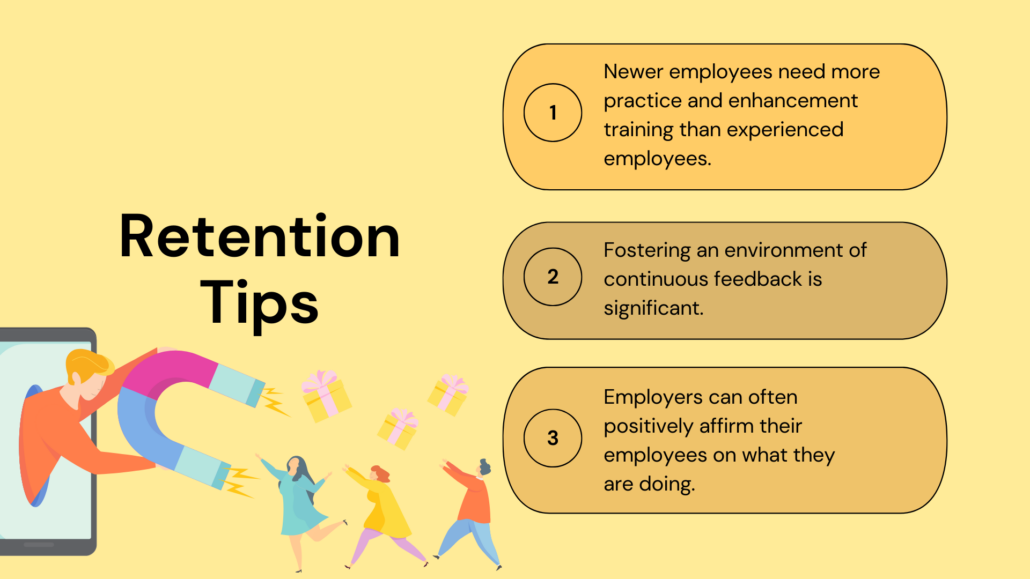
Employees expect that feedback so that they can use it the next day. Anthony’s solution to this is to put in systems to help tune their one-on-one relationships with their employees on campuses because, in his words, — “If they don’t have the relationship, it’s not a win-win for us.”
Matt’s solution to this is threefold.
“Number one, onboarding.”
Matt’s department went through a very significant cultural shift over the past 12 months, and onboarding was a critical component of its retention strategy.
They linked the hiring to the nest team, and his counterpart runs new hires, both working closely in tandem.
The second factor of Matt’s retention strategy is culture.
He explains this as a shift to a culture of quality and not just a quality phone call. What clicks to him is when one takes pride in one’s job, doing excellent work on that conversation with a student.
Making his third point on this topic, he says — “Our expectations of leadership are through the roof.”
That’s because people will stay engaged with a great or respectful leader who develops their colleagues while blocking and tackling admission issues.
Carla nicely summarizes both Matt’s and Anthony’s views. She also shares how having an open door where an employee could come back and have genuine feedback/conversation could also be a great way to retain them.
Violeta chimes in at the end of the second agenda on the discussion list with an out-of-syllabus question for the panelists. She asks, “What should a company do about burnout?”
Anthony answers this with clarity, stating how the important factor here is being able to have a conversation.
A leader can get to the desired outcomes by just talking to their team and having an open discussion because they are all looking at the same reports at the end of the day.
Carla also agrees and states that “We’re people first.” “Our team members need us just as much as we want them to understand how our students will need us and I think that’s critical.”
The discussion then turns to the last topic on the agenda; “How do we incorporate the use of tech to help keep our admissions advisors engaged?”
With this, poll number two is put out for the audience.
Poll: How often does your institution evaluate its tech stack?
Yearly – 18%
We are evaluating now – 4%
I don’t know – 56%
We don’t conduct regular evaluations – 22%
A high percentage of the audience said they don’t know how often it is, and that could be because there’s an IT department that manages that.
Matt’s approach to using tech was quite simple yet effective. He believes that there’s a lot that can be done in Microsoft Teams if one learns it and leverages it to its fullest potential.
From meetings and chats to polls, breaks, and even sharing funny jokes helps with a positive and uplifting work environment while staying connected throughout the day.
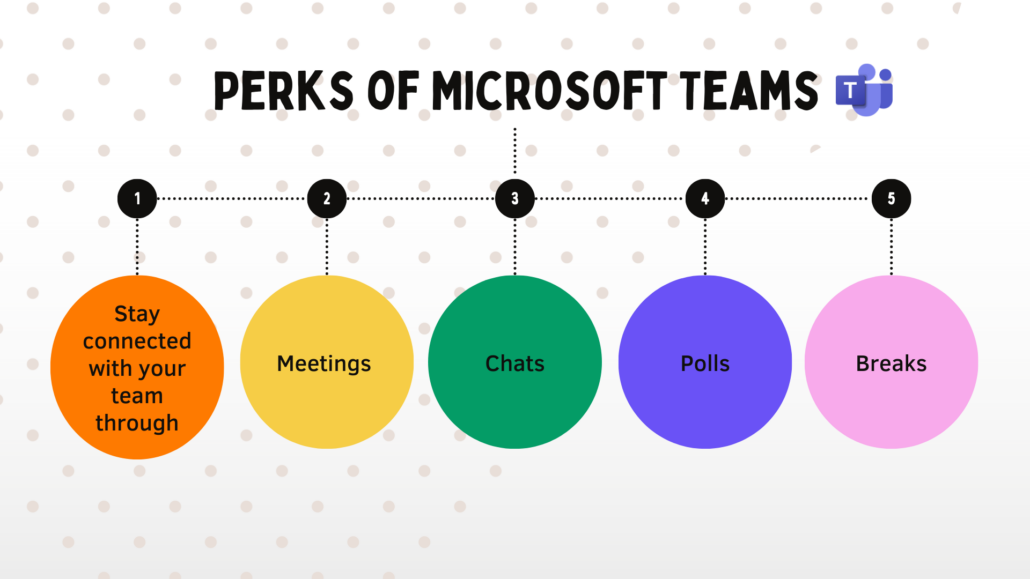
“We are a very data-focused organization,” is Anthony’s way of going about it.
He believes in tracking everything from a strategy map to Power BI and Microsoft systems for admissions, financial services, and career services.
While he understands that too much data in a people’s business could be counterproductive, the great thing about data is that it’s a starting point and helps develop a map. It shows where they need to improve and where they are successful.
His bottom line is that” Objective clarity is extremely important to be successful,” which can only be achieved through accumulated data.
The discussion concluded with all the panelists agreeing on the importance of tech in the education industry and admissions.
Violeta fantastically ended the webinar with a little note on the value that a CRM like LeadSquared brings to the process.
To learn more about LeadSquared and get started on the journey to success, ask for a demo today.
About our Panelists

Carla Jones, MBA
Business Development Consultant & Digital Marketing Director at SSG Business Solutions

Matt Lamb
Director of Remote New Hire Ramp Program at Ultimate Medical Academy

Anthony Romo MHRM, MBTI, TCF
Vice President of Enrollment & Graduate Services at San Joaquin Valley College
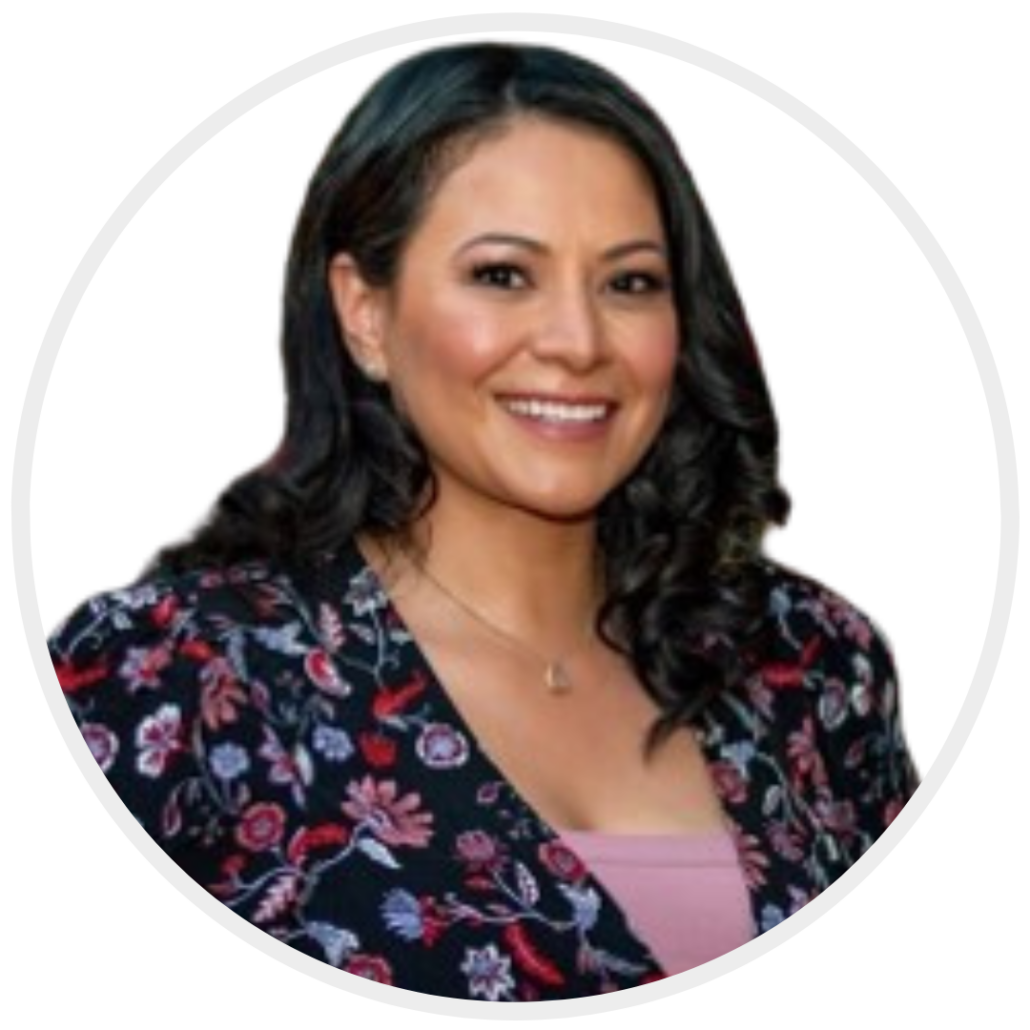
Violeta Tamayo
Senior Account Executive at LeadSquared









